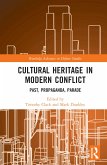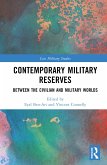This book offers a comparative study of military reserves in contemporary democracies.
A combination of budgetary pressures, new missions and emerging military roles during the past three decades has led the armed forces of democracies to rethink the training and use of reserve forces. Moreover, reservists have become central to the armed forces as part of moves towards "total" or "comprehensive" defense. Despite this, a scholarly bias towards studying regulars and conscripts means that reservists and reserve soldiers continue to receive only marginal attention. This volume fills that lacuna through a series of country studies examining how best to understand the peculiarities of reservist service. In contrast to regulars and conscripts, reservists are marked by their dual management of civilian and military careers, different family dynamics, diverse motivations and commitment to the armed forces, the material and non-material incentives they are offered, and their place in the political sphere. This volume suggests two frames to make sense of such differences: first, it looks at reservists as "transmigrants" traveling between the military and civilian worlds; and, second, it analyzes the multiple informal "contracts" and negotiations that bind them to the military. All the chapters adopt these conceptualizations, granting the volume a common focus and integrative frame.
The volume will be of much interest to students of military and strategic studies, civil-military relations, sociology and International Relations.
A combination of budgetary pressures, new missions and emerging military roles during the past three decades has led the armed forces of democracies to rethink the training and use of reserve forces. Moreover, reservists have become central to the armed forces as part of moves towards "total" or "comprehensive" defense. Despite this, a scholarly bias towards studying regulars and conscripts means that reservists and reserve soldiers continue to receive only marginal attention. This volume fills that lacuna through a series of country studies examining how best to understand the peculiarities of reservist service. In contrast to regulars and conscripts, reservists are marked by their dual management of civilian and military careers, different family dynamics, diverse motivations and commitment to the armed forces, the material and non-material incentives they are offered, and their place in the political sphere. This volume suggests two frames to make sense of such differences: first, it looks at reservists as "transmigrants" traveling between the military and civilian worlds; and, second, it analyzes the multiple informal "contracts" and negotiations that bind them to the military. All the chapters adopt these conceptualizations, granting the volume a common focus and integrative frame.
The volume will be of much interest to students of military and strategic studies, civil-military relations, sociology and International Relations.
'The reserve force in the 21st century has undergone tremendous change, increasingly relied on as an operational force rather than a strategic force. As a result, future conflicts will increasingly involve reservists. Chapters in this volume describe the new context for reserve forces internationally, and provide explanations of mechanisms that bind reservists to military service and elaborate on new concerns. The collection of readings here is central to informing researchers, policymakers, and military leaders of current and emerging issues of reservists and responding to these concerns.'--James Griffith, National Center for Veterans Studies, University of Utah, USA
'Hidden in plain sight, reserve forces go to war and fight COVID as they supplement and extend modern militaries. Ben-Ari and Connelly's Contemporary Military Reserves adds to the limited, yet growing military reserve literature by providing theoretical anchors as well as historical and contemporary context. International in scope, it is filled with rich questions, fresh insight and impressive empirical analysis. An indispensable resource!'--Patricia M. Shields, Regents' Professor, Department of Political Science, Texas State University, USA
'This volume comes with perfect timing as we witness the global revival of reserve forces, from the deployments in Iraq and Afghanistan to the campaigns against COVID-19. By using an innovative theoretical framework, a large number of highly experienced authors address a significant scholarly deficit as they examine reserve forces through a rich comparative study of multiple cases. This book should be a required read for practitioners and scholars interested in the future organization of the armed forces.'--Yagil Levy, Professor, The Open University of Israel
'Hidden in plain sight, reserve forces go to war and fight COVID as they supplement and extend modern militaries. Ben-Ari and Connelly's Contemporary Military Reserves adds to the limited, yet growing military reserve literature by providing theoretical anchors as well as historical and contemporary context. International in scope, it is filled with rich questions, fresh insight and impressive empirical analysis. An indispensable resource!'--Patricia M. Shields, Regents' Professor, Department of Political Science, Texas State University, USA
'This volume comes with perfect timing as we witness the global revival of reserve forces, from the deployments in Iraq and Afghanistan to the campaigns against COVID-19. By using an innovative theoretical framework, a large number of highly experienced authors address a significant scholarly deficit as they examine reserve forces through a rich comparative study of multiple cases. This book should be a required read for practitioners and scholars interested in the future organization of the armed forces.'--Yagil Levy, Professor, The Open University of Israel








